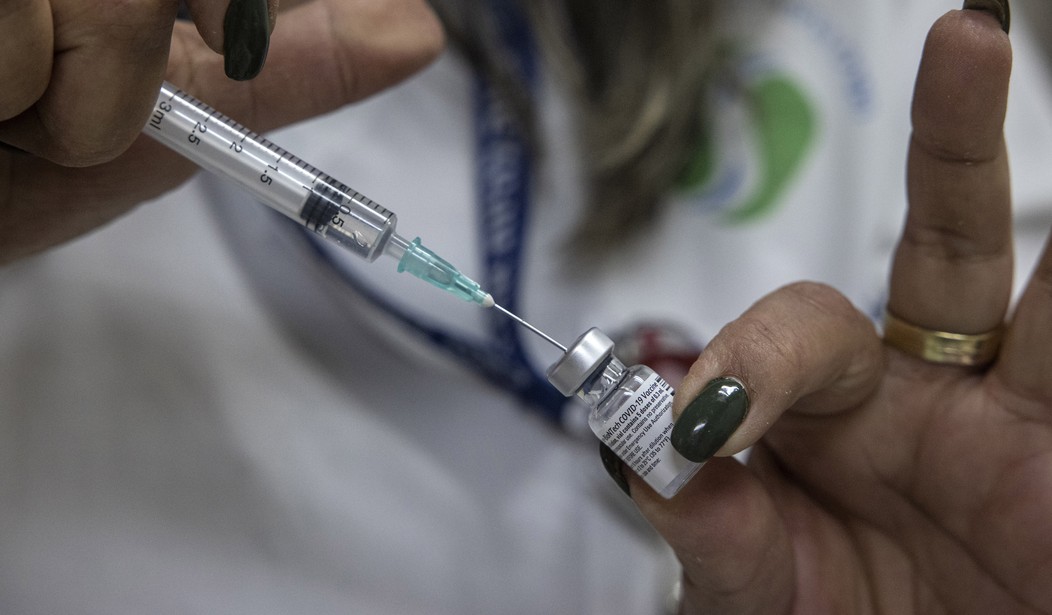The Chronicle of Higher Education published an astonishing list of 195 colleges and universities, both public and private, that will require all students to receive the COVID-19 vaccination to attend classes on campus in the fall. It would be astonishing if no students challenged this requirement based on the status of the vaccine alone. According to the FDA, the vaccines for COVID-19 are still considered investigational:
This guidance describes FDA’s current recommendations regarding the data and information needed to support the issuance of an Emergency Use Authorization (EUA) under section 564 of the FD&C Act (21 U.S.C. 360bbb-3) for an investigational vaccine to prevent COVID-19, including chemistry, manufacturing, and controls information (CMC); nonclinical data and information; and clinical data and information, as well as administrative and regulatory information.
The FDA defines an investigational drug as experimental:
An investigational drug can also be called an experimental drug and is being studied to see if your disease or medical condition improves while taking it. Scientists are trying to prove in clinical trials:
- If the drug is safe and effective.
- How the drug might be used in that disease.
- How much of the drug is needed.
- Information about the potential benefits and risks of taking the drug.
No one should be forced to be part of a clinical trial. This decision should be made between a patient and a healthcare provider based on many factors, including the risk of severe disease, the likely efficacy of current treatments, and other criteria. It might even include a second opinion. These universities ignore both fundamental features of our medical system and the right to informed consent and a second opinion. These are especially important for an investigational drug. In an open letter from the Association of American Physicians and Surgeons, President Paul M. Kempen, M.D., Ph.D. notes:
On behalf of the Association of American Physicians and Surgeons, I am writing to ask you to reconsider your new policy mandating COVID-19 vaccination of students prior to returning to campus.[i] Institutions of higher learning are divided on this issue.[ii] ,[iii] Although, at first glance, the policy may seem prudent, it coerces students into bearing unneeded and unknown risk and is at heart contrary to the bedrock medical principle of informed consent.
Kempen then lists 15 reasons the vaccines should not be required for the population at colleges and universities at this time, including the fact that the FDA will not be able to fully approve them for two years. He also notes the exceptionally low risk for severe disease in the college-age population. Kempen also highlights emerging research into menstrual issues reported post-vaccine, with at least 25,000 women enrolled, and the durable long-term immunity following recovery from COVID-19 that is detectable in lab testing.
It is not even clear what problem colleges and universities are trying to solve. If they have staff in a high-risk population, the vaccines are available to all Americans over the age of 16 at this point. If the at-risk employees are fully vaccinated, CDC data demonstrates that the vaccines are effective in preventing COVID-19 and reducing the risk of serious illness in the case of rare breakthrough infections. The risk of death for the fully vaccinated is not just low, it is infinitesimal.
Further, under what authority are colleges and universities even able to require an investigational vaccine for attendance? Only litigation will answer this question. For starters, a court filing would require the health bureaucracy to support the idea that recovered patients require vaccination. Even variants do not explain this need. As commentator Steve Deace says in his book, Faucian Bargain, based on all available research, the idea of vaccinating recovered patients is just flat-earth voodoo unless they tell us how COVID-19 is different than every other virus known to the universe.
We know that half the population wildly overestimates the risk of severe illness and death from COVID-19. It is also clear the median age for dying from the virus is 78, and 80% of those who suffer from a severe COVID-19 illness can be classified as morbidly obese. According to Deace’s analysis of mortality data, 50% of deaths in the U.S. occurred in nursing homes. Cases nationwide are declining, with fewer than 30,000 new positive tests reported on May 2, 2021. As Dr. Kempen points out in the open letter, these positive ratings may be false. This is especially true as prevalence declines and with a cycle threshold of more than 30 in use. Even the WHO says that the most common PCR tests should be an aid for diagnosis, not a diagnostic tool.
Parents and students should absolutely challenge these requirements at colleges and universities and insist that they respect the standard of informed consent and the doctor-patient relationship. At a minimum, state legislatures or the courts must establish liability for adverse effects from the vaccine now and in the future for colleges and universities requiring it. No student should be forced to take an investigational vaccine to have access to the classroom. The best way to ensure that colleges and universities back off is to make sure they can be held financially liable for forcing the issue.










